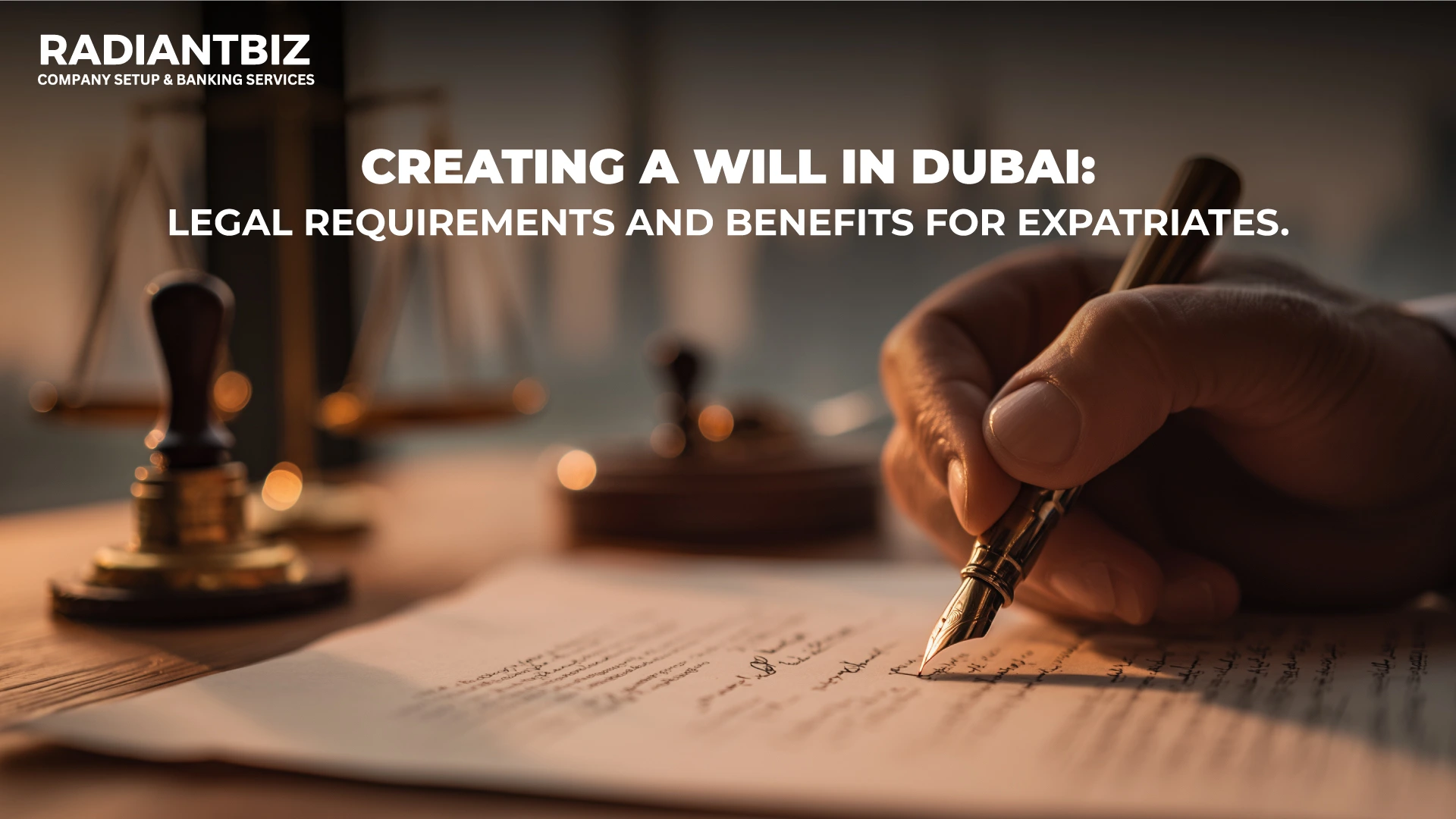Creating a Will in Dubai: Legal Requirements and Benefits for Expatriates


Table of Contents
Why Should All Expats in Dubai Consider Making a Will?
If you're an expat living in Dubai, you've probably worked hard to create a comfortable lifestyle, perhaps you own property, have savings within UAE bank accounts, or even own a business in the country. But have you considered what will become of these assets if you are no longer around?
Without an effective will, your assets could be locked up in legal holdups, blocked bank accounts, and for non-Muslims, the application of the UAE Shariah inheritance law which may not be preferred.
For instance, the existing cases have been those in which surviving spouses waited months to obtain access to funds merely because no will was available. In some instances, guardianship over minors turned into a court decision rather than a family one.
The good news is that Dubai offers expatriates several avenues for making a legally accepted will, be it through the Dubai International Financial Centre (DIFC), Dubai Courts, or Abu Dhabi Judicial Department (ADJD). Having the correct path can assist you in securing your assets, naming guardians for your kids, and simplifying things for your loved ones when they need it the most.
What if You Don't Have a Will in the UAE?

If you pass away without leaving a valid will (dying intestate) in the UAE, the distribution of your property will typically be governed by local rules of inheritance which is a shame when having a will in place allows you to even implement your home country laws.
Historically, for non-Muslims, courts have generally applied Sharia-based principles, which provide for fixed shares of the estate to specified relatives. This can mean your spouse won't automatically get everything, and assets may be distributed in ways that you didn't plan.
It also means:
- Bank accounts freeze until the court process is finalized.
- Property transfers take longer.
- Guardianship of minor children will be decided by the courts.
New legal developments have provided non-Muslims with more choices, like the DIFC and ADJD wills services, but these are only effective if you go ahead and issue your will. Otherwise, the default regulations come into play.
Which Types of Wills are Available to Expatriates in Dubai?
Is a DIFC Will appropriate for you?
A favored choice among non-Muslim expatriates is the DIFC Wills Service Centre, which is based on common law and permits wills to be written in English.
Advantages:
- Recognized by DIFC Courts.
- Efficient probate process.
- English-language documents.
- Includes Dubai-based assets and, in certain instances, assets in Ras Al Khaimah.
Disadvantages:
- Not necessarily effective outside its jurisdiction (check your emirate coverage).
- Higher issuance fees than some local court wills.
Should you use the Dubai Courts Will Service?
The Dubai Courts also permit expatriates to issue wills, these wills are dealt with under UAE civil procedures.
Advantages:
- Recognized throughout Dubai's legal system.
- Might be appropriate if you prefer to deal with the local courts.
Disadvantages:
- Arabic translation might be necessary.
- May be subject to local inheritance law unless specifically written for non-Muslims.
Could an ADJD Will be More Appropriate if You Have Assets Throughout the UAE?
The Abu Dhabi Judicial Department (ADJD) wills service is gaining popularity since it can cover property in all seven emirates.
Advantages:
- UAE-wide coverage.
- Accessible to any non-Muslim of any emirate.
Disadvantages:
- Requires conformance to ADJD formalities, such as certain formats and witness conditions.
Can a Foreign Will be Effective in Dubai?
A few expatriates already hold wills under their home country’s law. In some instances, UAE courts will consider a foreign will, but:
- It has to be translated into Arabic by an authorized legal translator.
- It has to be notarized and authenticated for UAE use.
- Enforcement takes longer compared to a locally issued will.
What are the Legal Requirements of Creating a Valid Will in Dubai?

While the specific requirements vary depending on the registry you use, here are the key criteria:
Age: In most cases, you should be at least 21 years old (in the case of DIFC wills, the minimum age may vary in local courts).
Mental capacity: You should have a sound mind when creating the will.
Religion: In the case of DIFC and ADJD non-Muslim wills, you have to indicate a non-Muslim status.
Documents: Passport in good standing, UAE residence visa, documentation of asset ownership, beneficiaries list, and any appointments of guardians.
Witnesses: Two witnesses are standard with DIFC wills, there might be different requirements for local court wills.
Language: English is accepted by DIFC, Dubai Courts, and ADJD might insist on Arabic or authenticated translations.
Authorization: Unauthorized wills are more difficult to enforce, authorization is highly recommended.
How Do You Actually Make and Authorize a Will in Dubai?
Making a will in Dubai isn't difficult if you stick to a straightforward process:
Step 1: Define your assets and collect documents
Include property, bank accounts, shares in the company, cars, jewelry, and even cyber assets.
Step 2: Select the appropriate will service
DIFC if you prefer common law and English documentation, ADJD for UAE-wide services, Dubai Courts for a local procedure.
Step 3: Utilize a qualified will lawyer
UAE-based lawyers are familiar with both the law and the procedural requirements, saving you from costly errors.
Step 4: Sign the will in front of witnesses
Comply with registry rules on witnesses, signing order, and identification.
Step 5: Have the will authorized
DIFC: Authorize online or by appointment.
ADJD/Dubai Courts: Lodge documents, translations, and notarization where necessary.
Step 6: Keep it safe and update it
Keep it safe and review it after significant life events, marriage, divorce, children, and buying new properties.
What Benefits Do You Get from Authorizing your Will in Dubai?
Complete control of your estate: You get to choose who receives what.
Name guardians for young children: Critical for expats who lack close relatives in the area.
Avoid lengthy delays: Probate is quicker when you have an authorized will.
Minimize disagreements: Precise directions leave fewer opportunities for disagreement.
Shield non-Muslim spouses and friends: Stops them from being excluded under default inheritance laws.
Cross-border alignment: Assists with coordinating UAE assets in your international estate plan.
How Much Does it Cost, How Long Does it Take, and What Mistakes should You Avoid?
Costs:
DIFC Wills: High authorization fees (usually in several thousand dirhams).
ADJD/Dubai Courts: Usually lower but additional costs include translation and notarization fees.
Legal fees: Dependent on complexity and lawyer's experience.
Timeframes:
Drafting: A few days to a fortnight.
Authorization: DIFC can be completed within a day, local courts could take longer.
Mistakes to Avoid:
- Assuming the foreign will will suffice.
- Failure to name an executor or guardian.
- Omitting to revise your will after life events.
- Failure to sign up the will in the jurisdiction in which your assets lie.
Should You Consider Estate Planning Other than a Will?
Yes. While the will is the cornerstone of your estate plan, you may also want to consider:
Power of Attorney: For financial or medical choices if you are incapacitated.
Trusts: To protect assets and for tax planning (if applicable).
Life insurance: As a source of liquidity for your beneficiaries.
Business succession plans: If you have a UAE company shareholding.
These instruments may be used in addition to your will for a better protection strategy.
What is a Quick Checklist for Creating a Will in Dubai?
- Enumerate all UAE assets.
- Select the correct will type (DIFC / ADJD / Dubai Courts).
- Name executors and guardians.
- Prepare with a competent lawyer.
- Authorize it formally.
- Store it safely and review it regularly.
What are the Most Frequent Questions Expats Have Regarding Wills in Dubai?
- Can a foreigner prepare a will in Dubai?
Yes, also non-Muslims can create wills using DIFC, ADJD, or Dubai Courts.
- Does a DIFC will protect all my assets globally?
Not necessarily. It's better to prepare separate wills for separate jurisdictions.
- What becomes of my assets if I do not have a will?
Local rules of inheritance take over, which might not be what you would want.
- Can I modify my will later?
Yes, you can cancel or update it at any time after the due procedure.
- Are Dubai wills open to the public?
No, they are not made public until probate proceedings start.
- How long before beneficiaries can receive money?
It varies by court, but authorized wills typically hasten the process.
Ready to Safeguard Your Legacy in Dubai?
Creating a will may seem something that you can "get to later," but the fact is, the sooner you create one, the more at ease you'll be.
Select the will type that suits your assets and family dynamics, engage the services of a lawyer or professionals familiar with the UAE's legal framework, and complete the authorization accordingly. Your loved ones won't have to wander through a maelstrom of complicated law when things get tough.
Begin today, compile your asset list, opt for your chosen will service, and schedule an appointment with your trusted estate planning expert.
Seek our professional on-the-ground guidance, contact us via mail at info@radiantbiz.com, WhatsApp or call us at +971521322895!



2.png)




.avif)